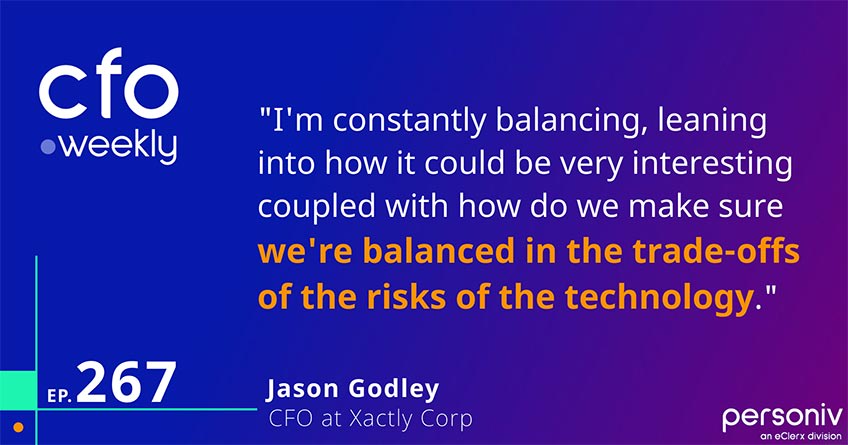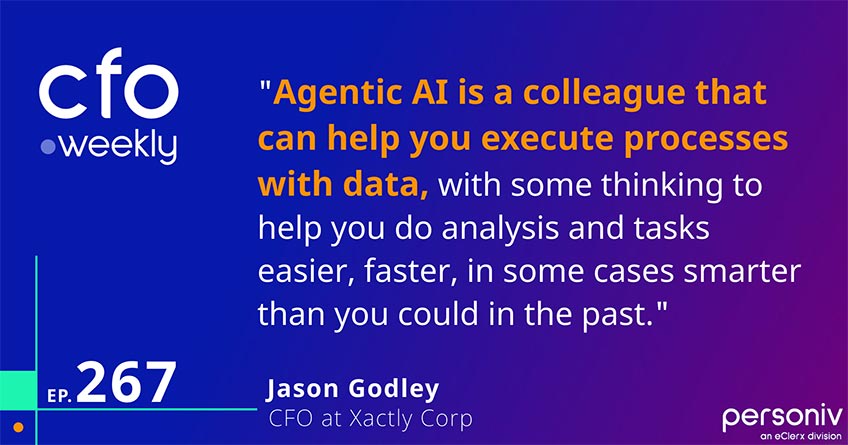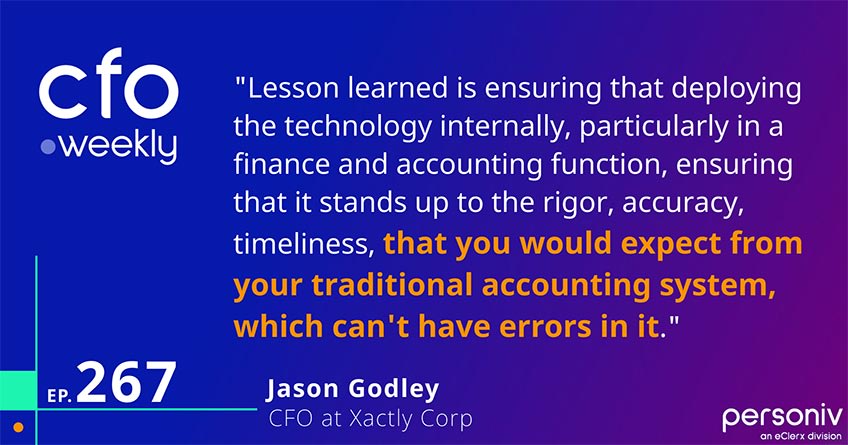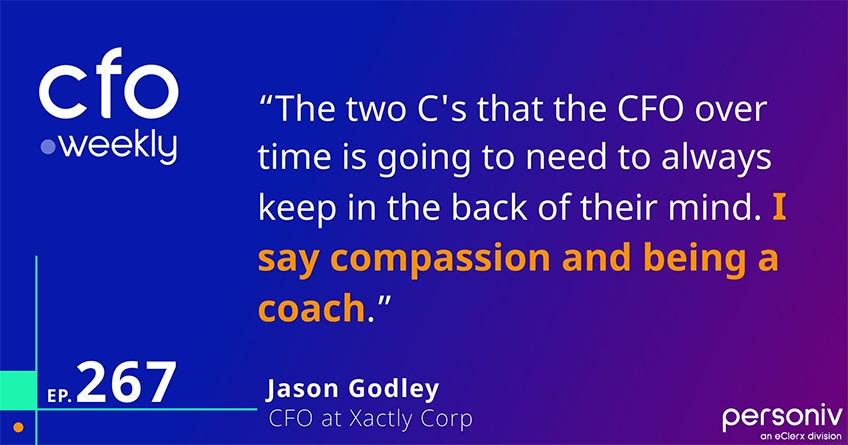
In this episode of CFO Weekly, Jason Godley, Chief Financial Officer at Xactly Corp, joins Megan Weis to explore the new agentic AI responsibilities of the CFO, and how this revolutionizes their role from financial overseer to business architect. Jason brings over twenty years of experience spanning public accounting at PricewaterhouseCoopers, seven years on Wall Street, and a decade leading finance at private equity and venture-backed technology companies.
With his deep background in enterprise technology and firsthand experience implementing AI solutions at Xactly Corp, Jason shares how finance leaders can leverage Agentic AI to transform core business processes, eliminate functional silos, and architect entirely new business models. Currently serving as CFO of Xactly Corp, a Vista Equity portfolio company, Jason oversees the deployment of AI-native solutions across finance, sales, and operations while maintaining rigorous governance standards.
Show/Hide Transcript
Megan - 0:56: Today, my guest is Jason Godley. Jason is chief financial officer at Xactly, a Vista Equity portfolio company. Xactly leverages a data-driven approach that provides insights across the entire SPM value chain, from sales planning to execution, including compensation to optimization. With access to predictive analytics and benchmark data, enterprises can now create optimal sales resource and capacity plans, balance territories, design the right compensation and incentive plans, and accelerate attainment and optimization of sales performance. Xactly provides the only AI-powered platform that combines revenue intelligence and sales performance management so organizations can unlock their full revenue potential. Backed by two decades of pay and performance data, Xactly's intelligent revenue platform is designed for finance, revenue, compensation, and sales leaders who want to drive quality, sustainable revenue. Jason, it's great to have you with us here today.
Jason - 1:55: Yeah. Thanks for having me. Good to be discussing.
Megan - 1:57: So you've built a career at the intersection of finance, sales, and technology, and few leaders have had a front-row seat to how AI is reshaping that landscape quite like you. So let's look at the beginning. Was there a specific moment or experience that made you realize that AI could truly transform the finance and sales ecosystem, and how has that shaped your approach at Xactly?
Jason - 2:20: Good question. I think there was everybody's first moment, which was like ChatGPT, and it was really hard to grok, at least from a business perspective, where that could go. So I got very curious around how the technology actually worked in terms of large language models. And I'm not a technologist, but spent a lot of time on YouTube understanding neural networks, how it worked, how it was able to actually do what it did. So I think that for me, I would say sparked two things. One, really tasting how it works and the power of where it could be used and where it could go. I think at the same time, it provided clarity too around some of the limitations of the technology. So I think that was the light bulb for me. And then as more applications came online and just following the space, connecting dots, you could really see the power of where it could be used. But I think it also ingrained in my mind, I think this will be a theme throughout our conversation, is on one hand holding two conflicting thoughts in my brain at once, which are one, really understanding the power of generative AI and where it can go both in the near term and long term. And also, maybe this CFO in me, a bit of inherent skepticism, if you will. Right? Having lived through a handful of technology cycles, knowing that there's going to be fits and starts, if you will. So I'm constantly balancing leaning into how it could be very interesting coupled with how do we make sure we're balancing the trade-offs of the risks of the technology? And what, sorry, Megan, what was your second follow-on question? How do we think about that at Xactly?
Megan - 3:57: Yeah. How has that shaped your approach at Xactly?
Jason - 4:00: Through the lens of me being CFO of our business, or to the lens of how Xactly generally is speaking to the market today?
Megan - 4:07: I guess let's take the lens of the CFO.
Jason - 4:10: So as we think about GenAI at Xactly, we have, I think it's called, our Gen AI Council across three pillars. One is, how do we think about building into our product generative AI? We think about it in terms of internal tools, which is maybe where the CFO swim lane is. And then element three is overall governance, which I think is probably worth talking about too later. So internally, from a tooling perspective, we have looked across the entire enterprise and tried to, in step one, understand existing pain points that could be solved with GenAI. Because I think the tendency, which can be seductive, is to see all these solutions out there that don't have a problem. So how do you be very discerning around clearly identifying a problem that fits within the solution set of GenAI and being thoughtful around what could work and not work? So I think we have found it's almost like, I'll use the analogy. So think about, maybe this is a bad analogy, but I was thinking about this this morning. You're like the coach for the US Track And Field Team, and there's a new brand new shoe that comes out. Let's say that shoe is Gen AI. Well, that shoe may be perfectly built for the sprinters, but for shot put or the long jump, that shoe may not be right dialed in. So that, I think, lends itself to prioritizing, okay, where does Gen AI really solve pain points? And let's deploy it as soon as possible. So I think one of the early use cases that remains today is on the engineering team, like using generative AI to code stuff. And then, in some cases, the shoe doesn't fit quite perfectly. So how do you, specifically in the finance and accounting organization, how do you identify areas of the organization where it can be helpful or not helpful, where do you lean in, and where do you kind of pause to wait for the technology to evolve? So that's kind of how we're thinking about it internally.
Megan - 6:16: And before we get into the meat of the conversation, let's step back a bit and just tell us a little bit about yourself and your career and Xactly.
Jason - 6:26: Sure. So I've been in broadly defined finance for the last twenty plus years. Started out in public accounting, so I was a CPA with PricewaterhouseCoopers for six years, three years in Denver, three years in Paris. And then I went to business school and then went to work for Wall Street for seven years in the Bay Area. And then for the last ten years, I've been CFO of private equity and venture-backed companies. So, I think during that time, while I've been a quote-unquote finance guy, it's been within the industry of enterprise technology, experience from software to data centers to you name it in terms of enterprise technology, so that's always been my lens.
Megan - 7:06: And, Xactly. Let's talk about that for a minute.
Jason - 7:09: So, Xactly is in the, what we call the sales performance management space, but what that means is we solve a handful of pain points for our customers. So we think about helping our customers first and foremost with their compensation plans. How do you make sure that your sales reps, you're designing comp plans for them and that your sales organization is getting paid fairly, etcetera, etcetera? Is there visibility for the CRO, for me, and for the actual sales reps themselves to understand, hey, I earned my commission this month. What's it going to make sure it hits my paycheck? Right? So that's the very plain vanilla version. But that's part of a broader suite of solutions. Right? We also have even before the reps in the company calculates their commissions, we offer the sales organization which overlaps with RevOps and finance, how do you even think about designing compensation plans? How many reps do you need to hit the bookings plan for the year? How should we design the compensation plan? Right? And in our case, we have nearly twenty years of data. We can actually leverage that to inform the management team on how to square their own business performance as it relates to this part of the organization around what are other companies doing, what are other companies' comp plans look like. And we can use that benchmarking insights to make sure that however you're architecting your go-to-market organization, you can leverage best-in-class information. The other thing is once you've built the comp plans, your go-to-market, you're paying your sales reps, we also have a tool called forecasting, which is to help you now that you've put all this in place, understanding, are you actually achieving the sales objectives that you thought you were? Right? So that's a single pane of glass that connects to the other parts of our system. Me, the CRO, and the CEO can be looking at this information, understanding, hey, how are we doing relative to what we thought we'd do for the plans? We have an end-to-end platform that serves our customers to that end.
Megan - 9:10: And who is the ideal customer? Anyone with a sales team?
Jason - 9:14: It's an overlap. It's between the office of the CFO and the office of the CRO. I think we'll get into this later with Gen AI, but I think the lines are blurring around the usage of tools, right? So we have historically been office of the CFO. And given this multitude of our three pillars of our platform, that is also overlapping with, say, RevOps and the sales organization.
Megan - 9:37: And let's dig a bit deeper into how this next wave of AI, particularly Agentic AI, differs from what we've seen before. So first of all, how do you define Agentic AI? And secondly, what makes it distinct from earlier generations?
Jason - 9:53: So I think Agentic AI is a colleague that can help you, and again this will evolve over time, but I think can help execute processes with data, with some thinking to help you do analysis and tasks easier, faster, in some cases smarter than you could in the past. Right? So, I think the difference from the past is take RPA or some of the earlier technologies, you have to really paint by numbers to get the outcome you want. And it doesn't have this thinking ability to sort through unstructured data, different things to help you in a manner that GenAI can do that the former technologies could not do. So it's an extra layer of, it's almost going from 2D to 3D in terms of the possibilities of what you can do with Agentic AI.
Megan - 10:51: And once leaders understand what it is, the next question often becomes when to invest. So from a CFO's perspective, how do you determine whether now is the right time to adopt Agentic AI, and how do you assess ROI when the technology itself is evolving so rapidly?
Jason - 11:08: Yeah. So I think to start, it comes back to where I started, which is I think the mindset of these competing thoughts—let's go fast can be very interesting, and also, I think the natural inclination from a CFO to ensure you're not getting over your skis. Right? So I think it takes a bit of first, a bit of courage from the CFO's perspective to not only go fast and invest, but also don't break things, if you will. So, there's always that tension going on. We try to take an intentional approach around how to think about that question. So, we start by identifying either tops-down or bottoms-up, an area of opportunity where it could be interesting. Relative to where the market is today, you can oftentimes get free or not too expensive tools to just go out and tinker. Right? So, we have a bunch of stuff in the wilderness. Are people using it? Why are people not using it? Is it interesting, not interesting? Right? So, get it out there, get it used, and what is the adoption? What is the feedback? So, we have an inventory, for instance, at Xactly around a fairly lengthy list of Agentic AI and regular GenAI assistants that people are using throughout their days. We are entering a phase, now that we kind of inventory, we're tracking who's using it, not using. So we have quantitative data around who's using it, we get real time feedback. We're entering a phase around, okay, what are the workflows or what are you doing that you used to do and try to quantify the incremental impact to the business around something that's being done. In each, it's a bit abstract because you want to pin it down, but sometimes it's very difficult because you're maybe adding, "Hey, I could do something faster," or, "I'm doing something more that I couldn't do," even though it could be a bit squishy. We try to put numbers around it to start to quantify the ROI. And you have a range of outcomes. You have certain things that are very easy to quantify, very clear ROI, things that are less clear. And then that's when you get into, okay, what is the cost, if you will, of this particular solution? What is the risk of using it? Which we can talk about governance later. And then those two overlapping things you can start to inform whether you should lean into investing or pause and wait for the technology to evolve.
Megan - 13:24: And building on that, Xactly has been a pioneer in sales performance management and revenue intelligence. How do you see Agentic AI enhancing these capabilities compared to traditional analytics or automation tools?
Jason - 13:37: So today in our platform, we have two different things. We have assistants. So, how you just make it easier to interface with the solution. Right? So as opposed to typically software, you have drag and drop and you're following a workflow, if you will, to do things. Now, you can use the prompt engine to literally go in and have it do things that you otherwise drag and drop, if you will, that makes it a lot easier from a user perspective. We also have agents and we have our own tool for this called Extend. If you want to build a bespoke application that may talk to and pull data from our solution, or data from your CRM, or data from another application, you're able to build actual workflows or reporting without being a technologist, and you're able to now use our agent builder tool to facilitate ease of our customers building high value applications, right? Because we have found a lot of our customers, while they love our platform, they come on, "I'd love to build this other dashboard over here, or integrate this data." Right? So we hand over the toolkit for them to be able to do that. I think over time, what you will find is, and I mentioned this earlier, today I think generally people think in terms of functions. Right? Sales function, RevOps function, finance function. I think with the advent of generative AI, I think the lines are going to start to get more and more blurry. So think about it the executive level, in particular the CFO, you're seeing everything happening in the business. So I think of it as what's happening Xactly, I don't think what is happening in a particular function. So as we continue to build our platform, it by default is going to be connecting to our CRM, the finance and accounting tools, the FP&A tools. So over time, you're going to be able to have an end-to-end platform through the use of agents that can at scale orchestrate, for instance, the planning process. So today it's the sales planning process and you kind of have these workflows, you hand it off between functions. The agents can almost do the territory planning, how many sales reps all the way through to the FP&A budget over the next three years through the use of agents with guardrails, with humans in the loop to actually orchestrate and manage the entire process. A lot of times companies, again, this is very siloed, different systems, different data sets with humans doing a lot of the work. Over time, that will go away, and it becomes much easier and smarter and faster for organizations to then plan end-to-end, and really the silos can start to blur. And I think we're well positioned based on our platform to be really a part of that journey for customers.
Megan - 16:30: I'm just curious, does the platform sit on top of a CRM, or?
Jason - 16:35: It's on top of itself. In its own data layer, in its own application layer, its UI, UX, all the components of the platform. But it certainly talks to the CRM, the FP&A tool, is constantly sharing and leveraging data from other systems of record.
Megan - 16:50: And one more thing I'm curious about, you mentioned that you have twenty years of comp data.
Jason - 16:55: Yes.
Megan - 16:56: Where did that come from?
Jason - 16:58: So as part of our arrangements with our customers, we just anonymize it. We don't know who, right, in terms of if you pull it up, I couldn't tell you who it is, but it's anonymized data across all of our customers.
Megan - 17:10: Makes sense. So you've also been through the implementation journey firsthand. So what lessons have you learned from deploying AI at Xactly that might help other finance executives considering a similar move?
Jason - 17:22: So I would say two things. And I think the first one is as it relates to our own platform I'm pretty proud of, which is generative AI by its inherent nature is not deterministic. In other words, can hallucinate, do other things. So it can be seducing to have a bunch of dashboards and whatnot because you get real time insights and information. If I can't go to the auditors or I can't go to the board because the information is wrong, that can be a problem, right? So I think lesson learned is ensuring that deploying the technology internally, particularly in a finance and accounting function, ensuring that it stands up to the rigor, accuracy, timeliness, etcetera, that you would expect from your traditional accounting system, which can't have errors in it. Right? So I think that's tenant one. Tenant two is on the governance side. Oftentimes, CFOs have a risk management hat. So data governance, privacy, information security—do you not have, I'll call it rogue applications in your environment where you have risk of data loss? So, because it's a bit of the wild, wild west still, and the broad compliance-type rules, regulations, best practices are trying to keep up with the pace of innovation, maintaining a pulse on those with members of your team, CISO, general counsel, etcetera, to ensure that whatever it is that you're deploying, you're not getting over your skis in terms of things you don't want it to do.
Megan - 19:02: And you mentioned that when you look at the organization, you see Xactly and not a bunch of silos. So, as you're looking across the enterprise, where do you see the biggest near-term opportunities for Agentic AI to deliver value? And conversely, which areas are you taking it slow?
Jason - 19:21: So we've seen tremendous benefit through the engineering organization with helping us build code a lot faster and much more efficiently than we could in the past. So, we're able to build functionality and features and deliver to the market and our customers and add value at a cadence much quicker than the past. In, let's say, go-to-market, there's a lot of opportunity. There's a lot of sales development reps, marketing workflows. There's a lot of low-hanging fruit around workflows that are manual, data that is disjointed across systems and not matching up to make things easier. So there's a lot of opportunity, I think, within Xactly, and I think generally speaking, where we can we are using and deploying both assistants and agents to help facilitate a much more frictionless go-to-market motion, if you will. And then within finance and accounting, we are, in Xactly's case, already pretty, I will say, dialed in. I would say we're not behind the rest of the company, but I think we are, across the organization, probably less in terms of tools being adopted. We are probably using less generative AI in our core operations than the rest of the organization. At the same time, we just had a bonus accounting off-site. We are very clear on what is the roadmap, where are the pain points, what are our vendors doing, where can we build things internally to help us be more efficient and more productive in our day-to-day lives.
Megan - 20:50: And of course, with new capabilities come new risks. So, what governance or compliance considerations should finance leaders keep in mind before embedding Agentic AI into core business processes?
Jason - 21:02: I would say primarily data and access controls. In other words, ensuring that, for instance, let's say you had an agent to support payroll. Ensuring that highly confidential information sits only with the people that should be looking at it versus those that should not. So I think it's really ensuring that information is not getting into the hands of folks outside of the folks who should see it within the finance and accounting organization. Because at which point you have a failure on that part, I think it just causes a lot of unnecessary consternation and risk for the company.
Megan - 21:40: Jason, this has been an insightful discussion. So as we wrap up, let's look ahead. What role do you see Agentic AI playing in shaping the CFO's responsibilities and decision making over the next, let's say, three to five years? And how is this going to change the role of a CFO?
Jason - 21:58: I love this question. So there's clearly they're going to be how do you deploy generative AI, but I think that's probably fairly obvious. I think a click above that is the CFO is going to need to be more of a business architect. And what I mean by that is business models are going to change. As you think about going from a long-term contract, that's an annual amount to a consumption model. Well, that's a big change for a company. So, I think the CFO is going to have a material seat at the table as organizations evolve with generative AI into an entirely different economic model than I think we are seeing today. So, given the CFO has a pulse on everything that is happening in the business and understands unit economics across the entire P&L, I think it's going to be very important in partnering with the CEO and the rest of the company to make that work. I think that will come, because that's a big, I would say, change management element of that. So, I think there are two, I'll call it the two C's that the CFO over time is going to need to always keep in the back of their mind. I say compassion and being a coach. So it is on one hand, helping support rearchitecting business models, but having compassion to the individuals in the company and helping to coach everybody effectively through that journey, I think will be extremely important. Because it's one thing to get the analytics correct around what the company ought to be doing or how it should evolve, but bringing the organization along for the ride and meeting them where they are, the CFO will have a core seat at the table. So it's having a degree of compassion for the employee base and coaching them along the way, I think will be very important.
Megan - 23:57: Jason, thank you so much for your time today and for sharing your insights with us.
Jason - 24:01: Thanks for the time. Very good discussion. Appreciate it.
Megan - 24:03: Yep. And to all of our listeners, please tune in next week. And until then, take care.
What You'll Learn:
-
How Agentic AI differs from traditional automation and RPA technologies
-
Why CFOs must evolve from financial oversight to business architecture
-
The critical governance and compliance considerations for AI deployment
-
Strategies for quantifying ROI when technology is rapidly evolving
-
How AI is blurring the lines between finance, sales, and revenue operations
-
The importance of compassion and coaching as business models transform
Key Takeaways:
Understanding AI's Power and Limitations
Successful CFOs balance enthusiasm for AI capabilities with healthy skepticism about its limitations. Deep technical understanding of how large language models work enables better decision-making about where to deploy the technology and where to wait for further evolution.

"I'm constantly balancing, leaning into how it could be very interesting coupled with how do we make sure we're balanced in the trade-offs of the risks of the technology." Godley pointed out. - 00:02:20 - 00:03:57
New Agentic AI responsibilities of the CFO
Agentic AI represents a fundamental shift from paint-by-numbers automation to intelligent colleagues that can execute processes, analyze unstructured data, and apply reasoning to deliver outcomes faster and smarter than traditional tools. This "two-D to three-D" evolution enables entirely new possibilities.

As Godley explained, "Agentic AI is a colleague that can help you execute processes with data, with some thinking to help you do analysis and tasks easier, faster, in some cases, smarter than you could in the past." - 00:09:53 - 00:10:51
Governance and Accuracy Standards
Finance leaders must ensure AI solutions meet the same rigor, accuracy, and auditability standards as traditional accounting systems. Strong governance around data access controls, privacy, and information security prevents rogue applications that create unnecessary risk.

"Lesson learned is ensuring that deploying the technology internally, particularly in a finance and accounting function, ensuring that it stands up to the rigor, accuracy, timeliness, that you would expect from your traditional accounting system, which can't have errors in it." Godley shared. - 00:17:22 - 00:19:02
New CFO Responsibilities as Business Architect and Coach in the AI Era
The modern CFO must evolve beyond financial management to architect new business models enabled by AI while demonstrating compassion and coaching employees through transformation. This dual role combines analytical rigor with change management leadership.

“The two C's that the CFO over time is going to need to always keep in the back of their mind. I say compassion and being a coach.” Godley commented. - 00:21:58 - 00:23:57
For more interviews from the CFO Weekly podcast, check us out on Apple Podcasts, Spotify, and our RSS or your favorite podcast player!
Instructions on how to follow, rate, and review CFO-Weekly are here.
Ready to navigate the new world of AI? We deliver premier finance and accounting solutions tailored to help CFOs drive strategic growth. Drop us a line today to learn more.





















